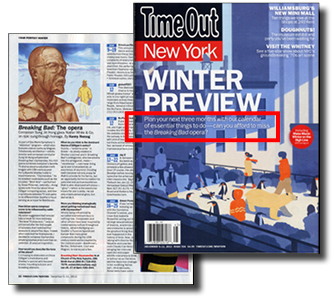December 2013
Breaking Bad: The opera
Composer Sung Jin Hong gives Walter White & Co. an epic sung-through homage.
by Kenny Herzog
 As part of One World Symphony’s “Addiction” program — which also features classic works by Wagner, Tchaikovsky, and Berlioz — artistic director and composer-conductor Sung JinHong will premiere Breaking Bad — Ozymandias. His mini-opera combines everyone’s favorite TV drama about a suburban meth kingpin with 19th-century poet Percy Bysshe Shelley’s ode to impermance, “Ozymandias.” As he readied movements such as the (no joke) “Bitch Aria” — performed by Jesse Pinkman, naturally — Hong spoke with Time Out about Vince Gilligan’s inspiring series, and how a symbiosis between TV and opera is no different than Goethe’s Faust serving as a muse for Beethoven.
As part of One World Symphony’s “Addiction” program — which also features classic works by Wagner, Tchaikovsky, and Berlioz — artistic director and composer-conductor Sung JinHong will premiere Breaking Bad — Ozymandias. His mini-opera combines everyone’s favorite TV drama about a suburban meth kingpin with 19th-century poet Percy Bysshe Shelley’s ode to impermance, “Ozymandias.” As he readied movements such as the (no joke) “Bitch Aria” — performed by Jesse Pinkman, naturally — Hong spoke with Time Out about Vince Gilligan’s inspiring series, and how a symbiosis between TV and opera is no different than Goethe’s Faust serving as a muse for Beethoven.
How did an opera composer come to be influenced by cable television?
My sister suggested that I should take a break for once and enjoy “the best TV show ever.” I was so entranced after the first couple of episodes that I watched the first four seasons in around four days. A week after I watched final episode, I decided to compose Ozymandias. Breaking Bad become more than an addiction. [It was] an inspiration.
<What do you think is the dominant theme of Gilligan’s series?
<Hubris — “extreme pride” in Greek — is clearly evident Shelley’s sonnet and in Breaking Bad’s protagonist, who transforms into the antagonist. Arete — “excellence” — can mean living up to one’s full potential, or excellence of any kind. Creating meth became not only a way to provide for Walt’s family, but an opportunity for him to realize his potential and pursue excellence. Walt is also obsessed with kleos — “glory” — which is the need to be known for one’s arete. He not only craves personal glory, but demands it.
<Were you thinking strategically about getting mainstream buzz with Ozymandias?
<>Artists being influenced by so-called mainstream buzz is nothing new. Composers and other artists have been inspired by contemporary culture throughout history. Johann Wolfgang von Goethe’s Faust so hypnotized Europe that many great composers during the 19th century wrote works inspired by the visionary poet — Beethoven, Berlioz, Schumann, Liszt, and Wagner, just to name a few.





